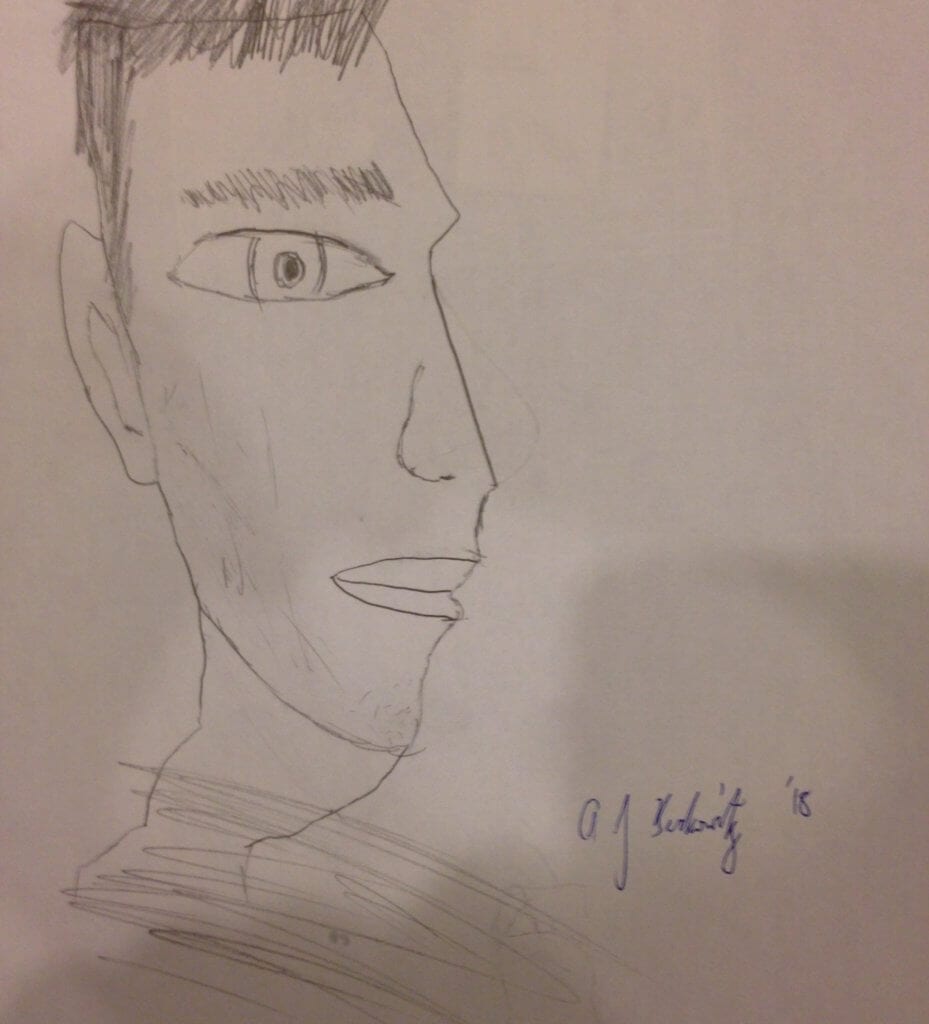Aaron Berkowitz
New York, New York, USA
 |
| Self Portrait, By Aaron Berkowitz (author) |
You look normal, good even. Statistically you are bigger, stronger than billions of people alive (and those who have died).
You learn to repeat mantras to affirm your being. There is power in prayer when action is impossible. You cry more too, beg. You force yourself to write, to make sense of this because otherwise the quiet will only make you hear what you fear. You cannot escape the metaphor.
Statistically, there is a 25% chance of incident between the ages of thirty and fifty. If you make it through that period without any problems, the likelihood obviously rises—the body deteriorates, does not fix itself on its own.
There are lots of advancements produced by heart research: robots performing more intricate surgeries, using stem cells or plants to grow heart tissue. In ten years, you might be able to grow your own heart and become an entirely refurbished man. Or, is something grown outside the body still a stranger, still registered as an invader? These cures might never work, might not address the underlying problem. They are not here fast enough.
Two years in the doctor puts you on blood pressure medication. Your systolic measurement is too high, another side effect of your heart’s insufficiency. You are supposed to stay healthy, eat correctly, keep active. But not too active — that puts a lot of pressure on your heart and can cause early rupture. There is slight evidence that not only will the medication help lower your blood pressure; it might help the valve as well. The unproven is touted as hope.
A family friend who is a pediatric cardiologist tells you it is better to know than not. There are things that can be done to prevent something terrible from happening. You can still live a [long] [modified] life.
You are eighteen and wish you never heard anything, that the pediatrician did not listen for the murmur, that you could still sit in silence without worrying your heart’s pumping was such a whimper, that it did not sound like a hard-count to the end.
This disease is one of the most common heart defects in the United States of America. It is estimated that between one and two percent of the population suffers from this. An actual number is hard to come by because they do not screen for it, it has to be noticed by a physician.
You were invincible yesterday. You are supposed to make it to tomorrow, but you cannot help wondering in the dark before you fall asleep. Sometimes you feel a pinch in your chest or arm and know this is what you have been waiting for. It is the waiting that is the worst; a heart attack would at least mean closure.
When you date you wait to bring it up until the third get-together, typically. When do you reveal to someone that they will need to take care of you one day, the way they take care of a child? I have seen the devastation of a broken heart, how much it takes to recover. They will now worry everyday where they did not before they met you.
Your parents speak of future plans and there is the built in irony that what they want for you no longer exists. Not just career-wise (there is no such thing it would seem), but you cannot promise to let them die first either.
Preexisting condition becomes a term you learn to hate. It is something that makes you less than. The cardiologist says, “Arnold Schwarzenegger has this condition and he only had surgery in his fifties.” You do not push yourself physically like him; maybe you can avoid an incident. Where are the celebrity endorsements for finding a cure? Heart disease is the leading cause of death in the United States — one in every four. Who worries about something so prevalent it is almost normal?
You learn to harness metaphor so you can speak of it without crying. You write poems, stories, songs. It will not force your tongue to palate; it will not hold power over your voice. The first step to cure is speech.
If you are lucky enough to have children, is the will to stay alive for them enough to overcome the gravity pulling blood back into your heart? The muscle is enlarged (all metaphors have two sides), but beauty does not last in the reflection of leaving children before they are ready for you to go.
How many times have you wanted someone to leave because they annoyed you, asked too much? How many times have you assumed they are deficient without recognizing there might be some underlying cause? There are so many diseases that cannot be seen, that have no cure. Maybe no one is actually healthy…
How many of the sick, like you, have begun to distance themselves from the disease, to refer to themselves or it in a third person vernacular so that they can feel normal again?
This will kill me, I know. But death is a requirement of life and because of its imminence, I know how much to live, how much this cannot be fixed right now. There are only the spaces between beats to fill, so I fill them with words.
AARON BERKOWITZ, MFA, earned his M.F.A. in Creative Writing from Sarah Lawrence College and is an educator living in New York. He is co-founder and editor-in-chief of the Jewish Literary Journal. His work has been published or is forthcoming in Rogue Agent, New York Dreaming, The Society of Classical Poets, Crack The Spine Literary Magazine, and Foliate Oak Literary Magazine, among others.
Winter 2018 | Sections | Personal Narratives

Leave a Reply